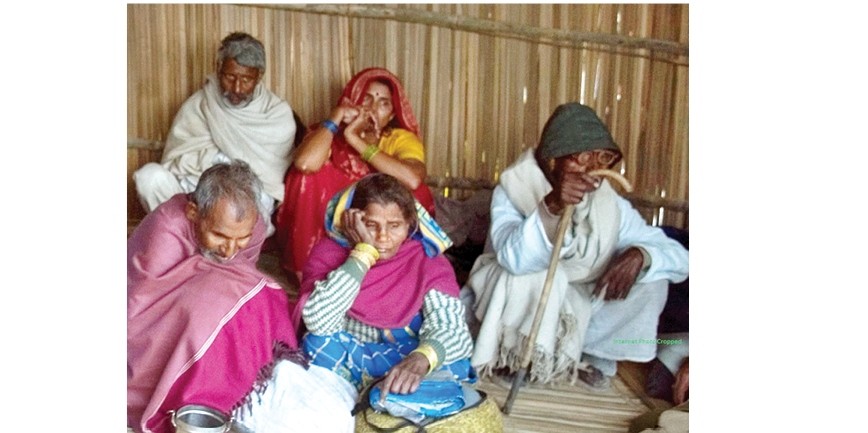For many elders, Dashain is time for loneliness, despair

By Arpana Adhikari
Kathmandu, Oct. 5: The Kathmandu Valley that witnesses hustle and bustle throughout the year, is gradually turning quiet, as a chunk of people have left the valley to join their families back home to celebrate Dashain.
Dashain is a time of the reunion of distant and nearby family members and relatives and merrymaking.
But for some people living inside Kathmandu, Dashain is not just an annual ritual. For them Dashain turns painful as they have to celebrate it in loneliness. They are the parents in their twilight years, whose children are settled outside the country leaving their parents to cope with the challenges of ageing alone.
More Nepalis have these days flown overseas for higher education, typically to America, Europe and Australia, and have settled there permanently leaving their parents back home alone.
There are hundreds of elderly parents to live by themselves in Nepal, as their children continue to live with their family in foreign land, and festival like Dashain adds owes to their loneliness.
“Since last few days, my whole neighbourhood are echoed with laughter, chirping of children and aroma of delicious food. But me and my wife are staying at the corner of the room, looking back to our four year old Dashain pictures, said Madan Maharjan, 67, a local of Lagankhel.
Maharjan’s all three children now live in the USA.
He recalls the time when Dashain used to be a fun-filled merrymaking time in the past when all his three sons, their wives and his seven grandchildren used to gather for Dashain celebration.
Sadly, his once lively house in Lagankhel is now almost empty. “It has been almost a decade, since my whole family haven’t celebrated the festival together,” lamented Maharjan.
“I feel bad when we don’t get to celebrate festivals with our loved ones. But still we are virtually celebrating Dashain through the video calls,” he added. The tale of Sabitri Upadhaya of Jorpati is no different.
Since last six years, Upadhaya, a 78-year-old single woman, was left with no other option but to mark Dashain with her caretakers.
Her two sons and one daughter have settled in America, Australia and Canada, shared Upadhaya.
“It will be a great if I meet with my loved ones and observe festivals together. But I have already grown old and feeble. I think there will be no one in my funeral.”
“I see other children, who were not in the village for an entire year, are returning home for Dashain. People were all smiling. But my children haven’t returned home in Dashain for the last six years,” said Upadahya wiping her tears.
The thrill of seeing all of her family members together on such a festive occasion has already faded from her mind, she added. “On the early morning of the main day of Dashain, they all appear in a video call, so I do all the rituals of Tika through this virtual means. This is how my Dashain has been passing.”
The sorrow of Bishnu Dhakal, 68, and his wife is not less than Upadhaya and Maharjan couple. His only son is settled in Canada and had no plan to visit her on this Dashain.
Dhakal said it is hard to cope with the loneliness, when it comes to Dashain and other festivals.
“However, we have daughters who visit us frequently, but during the Dashain they get busy in their house and our Dashain remained tasteless for past two years.”
The trend of settling outside the country has also accompanied the breakdown of the traditional Nepali joint family system, with the result that a large number of elderly Nepali have to cope alone in home.
“These left-behind senior citizens’ ultimately desire is the warmth of human relationship and presence,” said Parshuram Devkota, a 68-year-old retired teacher of Khumaltar.
The responsibility of children is now passing to paid nurses and workers to look after their old age parents, who help with everything from daily chores, said Devkota, adding that the communication gap leaves them clueless about their parents true needs.
“My children are away from the country, but fortunately Dashain tika is a just a click away though his children were seven seas away.
“These days’ families across continents could manage to keep the tradition of Dashian blessing alive all by means virtual tradition called video call. They are busy making their career, so it’s their life they can enjoy.”
Recent News

Do not make expressions casting dout on election: EC
14 Apr, 2022
CM Bhatta says may New Year 2079 BS inspire positive thinking
14 Apr, 2022
Three new cases, 44 recoveries in 24 hours
14 Apr, 2022
689 climbers of 84 teams so far acquire permits for climbing various peaks this spring season
14 Apr, 2022
How the rising cost of living crisis is impacting Nepal
14 Apr, 2022
US military confirms an interstellar meteor collided with Earth
14 Apr, 2022
Valneva Covid vaccine approved for use in UK
14 Apr, 2022
Chair Prachanda highlights need of unity among Maoist, Communist forces
14 Apr, 2022
Ranbir Kapoor and Alia Bhatt: Bollywood toasts star couple on wedding
14 Apr, 2022
President Bhandari confers decorations (Photo Feature)
14 Apr, 2022











